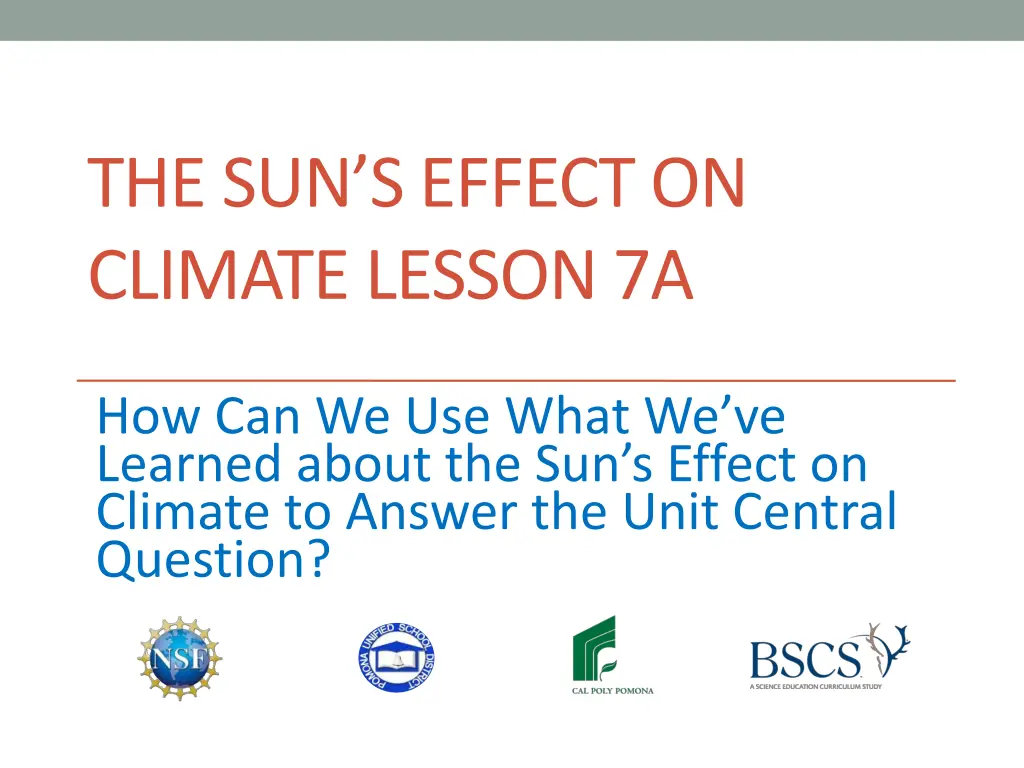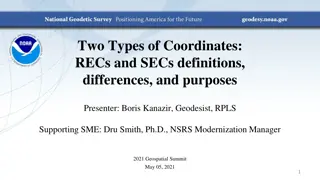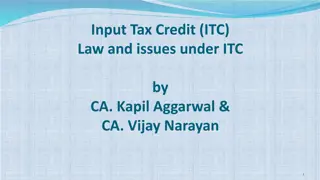
Utilizing Solar Influence on Climate for Understanding Earth's Temperature Variations
Explore how the sun's impact on climate shapes temperature differences on Earth. Key concepts include sunlight angles, Earth's axis tilt, and orbital factors, influencing varying temperatures. Engage in team challenges to refine ideas and prepare for a final presentation.
Download Presentation

Please find below an Image/Link to download the presentation.
The content on the website is provided AS IS for your information and personal use only. It may not be sold, licensed, or shared on other websites without obtaining consent from the author. If you encounter any issues during the download, it is possible that the publisher has removed the file from their server.
You are allowed to download the files provided on this website for personal or commercial use, subject to the condition that they are used lawfully. All files are the property of their respective owners.
The content on the website is provided AS IS for your information and personal use only. It may not be sold, licensed, or shared on other websites without obtaining consent from the author.
E N D
Presentation Transcript
THE SUNS EFFECT ON CLIMATE LESSON 7A How Can We Use What We ve Learned about the Sun s Effect on Climate to Answer the Unit Central Question?
Review: Key Science Ideas What did you learn about these factors and how they affect temperatures on Earth? The angle and intensity of sunlight hitting Earth s curved surface at different latitudes The consistent tilt of Earth on its axis Earth s orbit around the Sun Other factors, such as elevation and being near a large body of water
Unit Central Question Why are some places on Earth hotter than others at different times of the year?
Lesson Focus Question How can we use what we ve learned about the Sun s effect on climate to answer the unit central question?
Team Challenges: Steps to Follow Today you ll work in teams of three on one or more challenges. Follow these steps: 1. Discuss what your assigned challenge is about. 2. Share your ideas for solving the challenge. Make sure to use evidence from previous lessons to support your explanations. 3. Decide as a team which science ideas are most important for solving the challenge. 4. Write your explanations in your science notebook using complete sentences. Include a diagram or drawing to illustrate your ideas.
Team Challenges: Refine Your Ideas In our final lesson, each team will share with the class their ideas and explanations for solving their assigned challenge. To help your team prepare for this presentation, you ll share your ideas with another team that worked on the same challenge. The goal: Using your combined brain power to refine your ideas and come up with the best possible explanation for the challenge!
Talk Like Scientists! This is a great opportunity to practice working together and discussing ideas like scientists! Present your best arguments and evidence. Listen carefully to the ideas and evidence others present. Agree, disagree, add on, and ask questions. Be open to revising your ideas if someone else offers a better or more accurate explanation.
Team-Challenge Guidelines 1. Review your assigned challenge. 2. Team 1 shares their ideas, explanations, and drawings without interruptions. 3. Team 2 shares their ideas, explanations, and drawings without interruptions. 4. Both teams compare ideas and explanations and talk about areas where you agree or disagree. Support your arguments with evidence! 5. Decide how to combine and revise your ideas. 6. Record your new and improved explanations in your science notebook.
Lets Summarize! How can we use what we ve learned about the Sun s effect on climate to solve our team challenges? Think about this question and then discuss it with your team. Come up with one or two key science ideas for solving your challenge. Write these ideas in your science notebook (in complete sentences) and be prepared to share them with the class next time.
Next Time For our final lesson, you ll present your team s explanations for your assigned challenge! Spend some time tonight thinking about your challenge and see if you can come up with an even better explanation using the science ideas you ve learned!





















